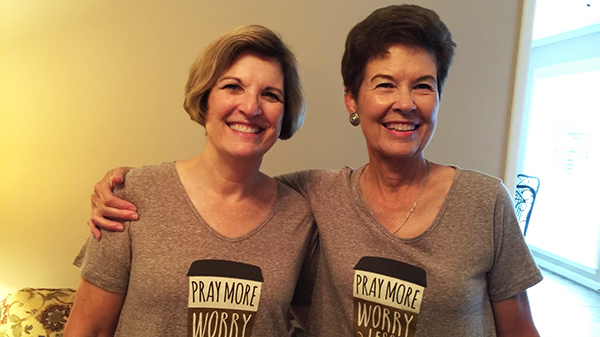Shortly after her husband’s death, a widow was driving home late at night. “The thought of returning to the empty apartment was more than I could face. Why go home? There was no one there. No one to care. There was no point going on,” she thought.
As she drove on in the darkness, these thoughts ran through her mind: “The highway was deserted. Why not end it all? Crash into a tree? They would think I had simply lost control of the car. My suffering would be over.” Calling that thought “a ten-second temptation,” the woman said, “I learned in those few seconds that I could never give up on life, no matter how lonely and sad and tired of it I was. Whatever life held for me, I had to face it. Loneliness and all.”
Offer support
The woman who writes so candidly about her feelings after the death of her husband is psychologist Joyce Brothers, author of “Widowed.” Her experience and feelings that evening are not unusual for someone who has lost a loved one to death. Such a loss can generate a deep despair and loneliness. Whenever a person is grieving a loss, he or she needs the support of family, friends and colleagues in order to make a healthy adjustment.
While there are some things only the bereaved can do for himself or herself, there are many ways others can come to his or her aid, reduce his or her pain and facilitate emotional recovery. Your gentle support will empower the bereaved to make the journey through grief and share in the joy of the psalmist who declared, “I will sing to the Lord, for He has been good to me” (Ps. 13:6). Here are 10 ways to help someone who is grieving.
1. Talk with the griever. Sadly some people react to a death by distancing themselves. They hesitate to be in touch when they learn a friend has experienced a loss to death.
“We live in a mourning-avoidant society,” said Peggy McClure, executive director of Community Grief Support Service in Birmingham. “People don’t really want to know that you cannot stop crying or find it difficult to get out of bed.”
Don’t ignore them
It is fear that keeps them away — fear of not knowing what to say or fear about death and loss. If these are your issues, then override your fear and make your presence known and felt. Pick up the phone and call expressing sadness and sorrow. If possible, be there in person. Don’t abandon your friend in his or her time of need.
A man recently wrote an advice columnist saying his best friend recently lost his 17-year-old brother in a tragic accident. “Some of our other friends have been behaving strangely toward him since then,” he wrote. “I understand not everyone knows what to say when they learn someone has died, but dropping off the face of the earth is not helpful.”
He went on to say that even a simple “I’m sorry” is greatly appreciated. The man concluded his letter with this plea: “Please tell your readers to pick up the phone, write a note, send flowers or drop by to talk. Ignoring a grieving person adds to the unbearable pain. I am sad for all the friendships lost because of this. I suspect these folks have no idea how hurtful their perceived indifference can be.”
2. Listen without passing judgment. Grievers need to feel heard and accepted. It is within your power to give them what they need. Allow them to talk about their loss and to share their feelings with you. Be available to listen with compassion.
Author Judie A. Bucholz advises, “Listen without being judgmental. The survivor needs to express himself or herself without fear of being judged. Try to understand that the survivor may need to tell his or her story. Perhaps more than once. Having someone listen empathetically provides comfort to most grieving individuals.”
3. Apply the Golden Rule of comforting. “[I]n everything, do to others what you would have them do to you” is the teaching of Jesus (Matt. 7:12).
Put yourself in the shoes of your grieving friend. Ask yourself, “How would I like to be treated just now? What would I like to hear? What kind of condolence letter would bring me the most comfort?” By applying the Golden Rule of comforting, you will avoid saying things that minimize the loss and are offensive to the grieving. Such comments to avoid include:
- He’s in a better place now.
- She lived a good life.
- I know what you’re going through.
- You need to snap out of this.
- Now, now — no tears.
- You must be strong.
- It’s a blessing in disguise.
Rather than make statements that frustrate and anger the grieving, those who apply the Golden Rule of comforting are more likely to respond with words that acknowledge the loss and the pain. Some examples of helpful, encouraging words include:
- I am so sorry.
- What can I do for you?
- How can I help?
- This must be very hard.
After his father died, one young man said, “Of all the people who came to the funeral, the person who stands out in my memory was a woman — a very good friend I’d known since high school. She simply hugged me and whispered in my ear, ‘I’ll cry with you until we both run out of tears.’”
4. Give him or her the freedom to grieve. Every person has his or her own unique way of grieving and recovering. Give him or her the freedom to do this his or her way. Don’t hide pictures of his or her loved one. Don’t gather up the deceased’s clothing, donating it to a charity. Don’t criticize behavior you don’t understand.
For example, a widow may wish to sleep on her husband’s pillow. A widower may wish to keep his wife’s bathrobe hanging in the closet. A sibling may want to wear his or her deceased sibling’s sweater. The grieving should be supported in finding his or her own way through grief.
“Bereaved people must grieve well and mourn well, so they can once again live well and love well,” McClure said.
5. Speak the name of the deceased. People erroneously believe that mentioning a deceased loved one by name will upset the survivor. The truth is that not speaking the name is far more upsetting.
One woman tells what transpired after her son Andrew died. “I noticed the silence of people who did not mention Andrew’s name or his life was deafening to me. There were no stories about him anymore. It felt like ‘out of sight, out of mind.’ My son had lived; he had been a part of my life. I had dreams for him. He was my future. I was frightened that everyone would forget him, and I needed to hear other people say my Andrew’s name. I could not stand the thought of going through the rest of my life not ever hearing or saying his name again.”
6. Encourage faith. A loss to death often tosses people into “a dark night of the soul” — a phrase often used by Christian mystics to describe times in life when God seems painfully absent.
Whenever a griever expresses this spiritual lament, gently remind him or her that God sees, God knows and God loves him or her. He or she may need to have his or her memories refreshed about Bible verses that offer hope, such as “For I know the plans I have for you,” declares the Lord, “plans to prosper you and not to harm you, plans to give you hope and a future” (Jer. 29:11).
Another passage that can help the grieving is Psalm 138:8 — “The Lord will fulfill His purpose for me; your love, O Lord, endures forever — do not abandon the works of your hands.”
Help them grieve
7. Recommend a support group. These are healing communities, places where a griever can express his or her feelings without fear of judgment or misunderstanding and places where he or she will see others successfully managing grief.
After his father’s suicide, Albert Y. Hsu tells of anonymously receiving a brochure in the mail. “Survivors of Suicide is a support group open to anyone who has experienced the loss of a relative or friend through suicide,” it read. It had been six months since his father’s death, and Hsu thought he was “holding together well enough.” Nevertheless he decided to attend. In his book “Grieving a Suicide,” he shares what happened when it was his turn to speak. “I had not cried for my father for some months now, and I was surprised that tears came back so quickly.
As heads nodded around the room, I exhaled a long-pent-up breath of relief. These were people who understood the grief of suicide. I didn’t have to worry about what they would think of me or the suicide; they were a community of fellow survivors, helping one another grieve on the journey.” Hsu further reminds all who grieve there is healing power in grief support groups.
Offer practical help
8. Send a card on special days. These include the deceased’s birthday, death date, anniversaries, holidays (Thanksgiving, Christmas, Hanukkah, etc.), as well as special family events such as weddings, confirmations, bar and bat mitzvahs. In the card, offer a simple expression of remembrance and support such as this: “I am thinking of you during this time and remembering (name of the deceased).”
9. Do practical things such as preparing meals, cleaning the house, running errands for the person or helping with the children. Bring him or her books that will inform and inspire him or her on his or her journey through grief. Give him or her a candle to symbolize light during his or her dark time.
One widower recalls, “Some of my warmest memories during that very difficult time were practical things a couple of friends did for me. One woman gave a beautiful journal saying, ‘You can write out your feelings at 3 a.m. when you can’t sleep.’ Another friend gave me a photo album saying, ‘When you’re ready, you can put together a photo history of your life together.’”
10. Check in on weekends. Many grievers find weekends very difficult. Unlike the workweek, which can be filled with various activities during the day and after work, weekends have a lot of down time creating excruciating loneliness.
Brothers said weekends are “the worst … I had no defense against the loneliness that invaded me on these days. Each one reminded me of how much I had lost and how much my life had changed.”
Remember your grieving friend on weekends. That may be the ideal time to invite him or her out for coffee or dinner or to the theater or a sporting event. You may be the only reason he or she gets out of bed that day. (Kelley Brown contributed)




Share with others: